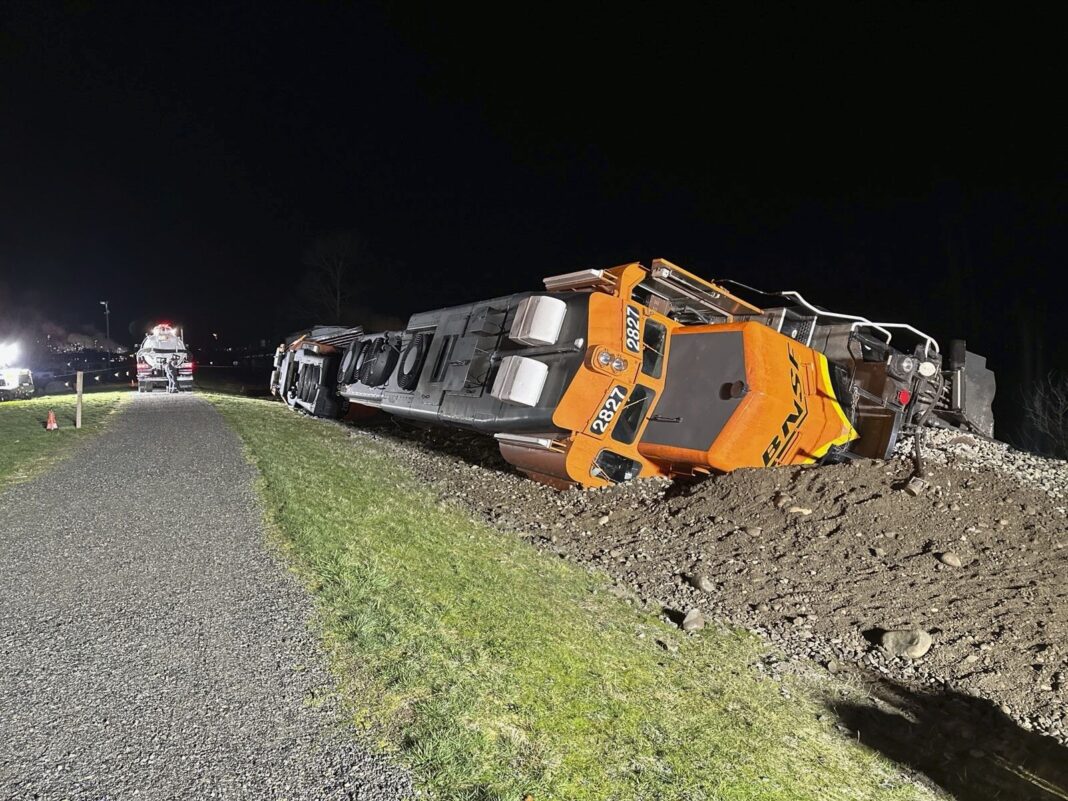Without permission from the Swinomish Indian Tribal Community, BNSF in 2012 began transporting 100-car trains of highly combustible crude oil through Swinomish land, court documents show. The tribe sued in 2015, alleging BNSF was running trains with four times the number of cars permitted under an easement agreement with the tribe. The civil trial began in a federal courtroom in Seattle on Monday to determine if BNSF willfully, consciously or knowingly trespassed over the reservation and whether it intentionally breached the 1991 easement agreement.
The trial comes just days after two BNSF engines derailed and . In an opening statement, Paul Lawrence, an attorney for BNSF, acknowledged the railway had made mistakes. “Mistakes? Yes.
Losing legal arguments? Yes. Breach of contract? Yes. Trespass? Yes,” Lawrence said.
“But the evidence will show there was no deception. . .
. None of the characteristics we associate with bad faith. ” Witnesses testified Monday morning that the railway had in the past failed to communicate the details of Swinomish’s easement agreement across its departments.
Both Katie Hower, vice president of consumer products, and Cary Hutchings, the director of corporate real estate at BNSF, said the easement agreement with the tribe was one-of-a-kind. There are likely no other agreements or restrictions like it that the railway has had to work around. According to the railway’s website, “no other railroad has more experience or expertise than us in helping you move crude oil to our nation’s refineries.
” Attorneys for the tribe and railway also questioned witnesses about early communications between the parties regarding usage of the tracks. Stephen LeCuyer, legal counsel for the Swinomish tribe, said he felt conversations with the railway went south in December 2013. He and the tribe were under the impression, he said, in July 2013, that BNSF would soon provide a comprehensive outline including compensation for a defined amount track use.
But in December 2013, BNSF negotiators presented a proposal that would have eliminated a cap on train usage without meaningful compensation adjustments, LeCuyer said. The letter stated that an amended easement “would eliminate the limitation on volumes ( e. g.
, cars per day), as well as the periodic reporting obligation. ” Stephen DiJulio, an attorney acting as a facilitator of these discussions on behalf of BNSF, said that was not his feeling at the time. He said the letter was in no way intended to be antagonistic.
The issue in court this week dates back to 1889 when BNSF’s predecessor, the Seattle and Northern Railroad Company, constructed a railroad through the Swinomish Reservation. The tribe objected, and court documents say the railway failed to obtain permission by treaty or congressional approval before completing the railroad. The railway had used the tracks without permission for decades, and in 1970, the Swinomish Indian Tribal Community objected.
When the tribe and railway were unable to come to an agreement, the tribe asked that the United States bring a lawsuit against the railway for trespass and removal of the rail line in 1977. That fall, the railway was denied a right-of-way application from the federal Bureau of Indian Affairs because it lacked consent from the tribe. In an arms-length negotiation, the tribe and BNSF reached an easement agreement in 1991.
The easement agreement said “only one eastern bound train, and one western bound train, (of twenty-five (25) cars or less) shall cross the Reservation each day. ” “Railroads also had a history of taking land from Indian tribes or from local government,” U. S.
District Judge Robert Lasnik said while questioning a witness. “And basically, the expression ‘I got railroaded,’ existed for a reason. ” “Could you see how the Swinomish Tribe might feel that, after telling you — the predecessor of Burlington Northern — in 1889 ‘no, you can’t build the track,’” Lasnik continued, “and they went ahead and built it anyway, and never paid a dime to the tribe for almost 100 years, that they might feel a little bit like they’ve been railroaded?” However, the BNSF vice president, said that she wished all the company’s involved departments knew about easement at the time of the move to expand carrying capacity, and that she feels apologetic.
But the railway maintains that it was upholding its “common carrier” obligations in meeting the ask of Tesoro, now the Marathon oil refinery. Under federal law, rail companies are required to provide reasonable freight transportation upon request. Lawrence, BNSF’s attorney, said the duty to serve is “baked in the DNA of BNSF,” and something that is communicated in training and reinforced in practice.
In 2020, the 9th U. S. Circuit Court of Appeals affirmed a federal court ruling that found BNSF had breached the easement agreement, and the tribe has the right to enforce it.
The railroad crosses sensitive marine ecosystems over a swing bridge over the Swinomish Channel and a trestle across Padilla Bay within the reservation. These water bodies connect with other marine waters of the Salish Sea, where the tribe has treaty-protected rights to fish. “Fishing is at the heart of the Swinomish social, cultural and economic life,” LeCuyer said in a 2015 interview with the Skagit Valley Herald.
“If the ecosystem were contaminated, it would strike at the heart of the tribal community. ” The tracks carry trains just a few hundred feet away from the tribe’s economic assets: a casino, hotel and restaurants. All of Washington state’s oil refineries are on or near tribal reservations.
Indigenous communities across the United States bear disparate impacts of the oil and gas industry, according to a 2018 report. — Isabella Breda, The Seattle Times — News researcher Miyoko Wolf contributed to this reporting. .
From: oregonlive
URL: https://www.oregonlive.com/news/2023/03/trial-begins-over-trains-on-tribal-land-in-washington-only-days-after-diesel-leak-from-derailment.html



